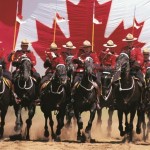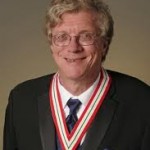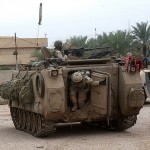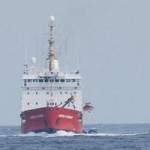RCMP files show Liberal government regarded criticism as potential subversion.
by Paul Weinberg
“Surreal and creepy” is how Mark Starowicz describes RCMP files released last summer that depict long-forgotten conversations he and fellow young journalists held at an editorial meeting of the small muckraking magazine, the Last Post, in June 1971.
The creator of As It Happens and other CBC shows who is currently the public broadcaster’s head of documentaries, appears to be in the same peculiar company as Walter Gordon, Northrop Frye, Tommy Douglas and other redoubtable Canadians who have been targeted by the RCMP Security Service (the precursor to today’s CSIS) in the 1960s and '70s, for their alleged subversive activity.
“I am not surprised first of all [by the RCMP’s surveillance of the Last Post], just because of what we know about the context of the times [early 1970s in Canada]. I mean the scale of what [the Mounties] did. I mean, it all came out in the McDonald Commission. Look at the Canadian Encyclopaedia [about the Security Service]. You have to pull your hair all over again.”
One RCMP file says, "it is felt that given the opportunity to embarrass the Government on any issue, the persons employed by it would do so. This is where the concern of the Security Service lies with the Last Post.”
Starowicz is referring to a royal commission that then-Prime Minister Pierre Trudeau established in the face of credible reports of illegal RCMP Security Service activity – the so-called “dirty tricks,” which included the theft of the Parti Quebecois membership list, the burning of a barn and the break in at a left-wing news agency in Montreal.
The Security Service’s modest 22 pages on the Last Post (embedded in full below) are part of a larger package of documents and memos, ominously titled “the Penetration of Canada,” released from Library and Archives Canada (also known informally as the National Archives) as part of an Access to Information request.
But it wasn’t just the left-wing slant of the Last Post that seemed to disturb HC Draper, assistant commissioner and deputy director general (operations) at the RCMP Security Service back then. Before holding that position, “Howie Draper" was “the main voice on investigations involving subversion,” says one of his former colleagues in the SS.
In a June 12, 1973 memo, marked “secret,” part of the RCMP’s Last Post files, Draper wrote the following to AF Hart, the under secretary of state for External Affairs: “Although the Last Post is not of major significance to the Security Service, it is felt that given the opportunity to embarrass the Government on any issue, the persons employed by it would do so. This is where the concern of the Security Service lies with the Last Post.”
Draper’s remarks raise the unanswerable question as to whether other high profile and lively journalists in larger media outlets may have been similarly targeted for surveillance, says other Last Post alumnus, Robert Chodos (currently the managing editor of Inroads Magazine). “The impression one gets from these files is that they regarded critical journalism as subversion.”
Started in 1969 by young journalists, the Last Post lasted about ten years as an independent magazine, and at its height had about 15,000 subscribers.
“The Last Post did not have a political line as such. It was generally left-wing and critical of corporations and the government. But there were some articles that were favourable to the NDP. We even ran articles that were favourable to the government — one, I remember, was the Competition Act that the Trudeau government brought in,” says Chodos.
Two issues of the Last Post in particular garnered a lot of attention. One was a special edition devoted to the machinations – government and police – behind the Trudeau government’s proclamation of the War Measures Act in Quebec following two FLQ kidnappings – which led to the suspension of civil liberties and 500 arrests.
“A lot of the insight and information on the War Measures Act were from people in the press, in the press gallery and the Quebec papers [where] there was a muzzle on,” Starowicz recalls.
But the focus of the released Security Service files on the Last Post was on the other big story for the magazine – the leaking of excerpts of a report by renegade researchers on a committee studying poverty. “Telling the chairman of the Senate Committee on Poverty, David Croll to get stuffed was only an incidental but necessary act…” reads the resounding headline of the front cover of the summer 1971 issue of the magazine.
Novelist and journalist Ian Adams recalls his revealing magazine articles on the poor in Canada and his book, The Poverty Wall, got him the research gig on Senator Croll’s committee. He relates that he and another writer, the late Bill Cameron, as well as two economists, later bolted from the committee because they felt that the Liberal senator was keen on watering down their call for a comprehensive guaranteed annual income just as the ruling Liberals faced a difficult 1972 federal election.
“Crowe tried to get Cameron and I to rewrite the report, to take out all of the stuff about negative income tax rates, guaranteed annual income and what kind of support people needed in various regions of the country, all of the real nuts and bolts of how to do it. They were terrified of losing votes by suggesting there should be a national standard for a minimum wage,” says Adams. (The Real Poverty Report ended up as a best selling book for Mel Hurtig’s Edmonton based publisher, he notes, coming out months before Croll’s was available for public consumption.)
Emerging from the professionalism of Maclean’s magazine, but also a bit of a leftie outlier in the media, Adams was surprisingly unimpressed by the Last Post. “I thought it was very fly-by-night, but the media loved [the issue on the Real Poverty Report]. They made a huge deal out of it.”
Adams’ name also pops up briefly in the anonymous RCMP investigator’s detailed account of the Last Post’s June 1, 1971 negotiations with the renegade researchers and the costs involved in publishing their excerpts.
But it is the comments of Starowicz that were closely scrutinized by the Mountie in the same memo. “Starowicz reaction and comment concerning the hint of Marxism in the Last Post are of particular interest….It is the first instance that he actually indicated what the theoretical position of the Last Post is and indicated a more radical left alignment.”
Today, such comments help reinforce the point made by a number of academics and journalists on the RCMP including Starowicz that the Security Service, made up of high school graduates at the time, was not especially well schooled on political theory and the different permutations of the left. “Last Post was not Marxist; it was intended to be fairly mainstream,” says Starowicz.
Robert Chodos expresses in retrospect his surprise at the level of detail in the Security Service files about the Last Post and extent of the surveillance over a three year period. “The other question that sort of came to my mind was — how were they getting this information? I can’t think of anybody privy to that information who likely would have been the source for the RCMP.”
The notion of a police agent mixing with among a group of Last Post journalists who were and are friends today is quite disturbing for Chodos, but he says “I don't want to get paranoid.”
Starowicz argues that the RCMP Security Service more likely used sophisticated electronic surveillance equipment to tape the Last Post editorial meetings. “It could have been bugged. If anybody was taking notes about the meetings of the poverty report he must have been taking them awfully quickly,” he says.
But historian and security expert Steve Hewitt has his doubts, maintaining the informant thesis is more plausible for the Security Service in the early 70s.
“Technical surveillance was rarely used because it was expensive, involved considerable human resources, [and] often would require physical access to the property and a warrant. The Mounties would have had to have known in advance where meetings were occurring in order to plant microphones, and how likely is that?”
A former RCMP officer who requested anonymity agrees, adding that the Security Service in the 1970s preferred to interview “cooperative” individuals at targeted organizations, versus planting an officer inside them.
“The Service was expected to keep informed and was expected to answer questions raised by other parts of the government, especially if there was any security concerns raised through the Sol. Gen. Office [Solicitor General’s Office in Ottawa]. So, I am not surprised that they would have knowledge of the Last Post and in fact I would be surprised if they did not have.”
The other aspect of the Security Service’s files on the Last Post which stand out is the innuendo and suspicion that appear in the memos exchanged by members of the force at various levels of responsibility. They followed Robert Chodos’ formal request by letter in 1973 to speak to the head of the Crisis Management Centre at the department of External Affairs within the federal government.
One unnamed investigator in “D Ops” (which security expert and University of Victoria political scientist Reg Whitaker explains was a Security Service operation engaged in counter subversion efforts in both Quebec and across Canada) discusses in a May 11, 1973 memo, certain conversations about Chodos’ inquiry with various people within the Crisis Management Centre. “There was some possible involvement by the Soviets with certain members of the Last Post. However I told him [a certain Colonel Sutherland] I could not elaborate further on this particular point.”
A Security Service memo dated May 9, 1973 demonstrates that the force knew quite a bit about Chodos.
“Chodos went to Ottawa, on the overnight train, on 25-A-73, where he intended to spend a few days finishing the research for his book on the CPR. From Ottawa he planned to travel to St John’s Newfoundland, via Montreal it is believed, where he planned to stay with friends (unidentified) until the end of May 1973, to begin writing his book….[redacted]..Chodos has received an Ontario Arts Council grant to help finance his book.”
Chodos has no memory of his ultimately fruitless search for the Crisis Management Centre four decades ago. As a reporter for the Last Post magazine – making $100 a week at times – he wrote countless letters to many federal departments in Ottawa in his search for stories.
“They knew what we said at meetings, where we were going and yet they really didn't understand it at all, in terms of what we were actually doing. They put it in their own context which had nothing to do with our own context. I think [the investigators] started out with the assumption that we were some kind of conspiracy and they attributed everything as evidence of that conspiracy.”
As an aside, Whitaker has some explanation for why alarm bells were set off at Security Service when Chodos innocently arrived on the scene. For one thing, the crisis management centre was not at External Affairs. Instead, the historian says, the Trudeau government had established “an operations centre” in that department because of a fear (later shown to be unfounded) that the FLQ kidnappers had ties to foreign terrorists. “It acted as the nerve centre of the October 1970 Crisis response in Ottawa.”
Meanwhile, it is possible more hidden RCMP files on the Last Post can be retrieved from the National Archives. One former Last Post manager, Drummond Burgess, says he may pursue an Access to Information request to determine if that is case. This is not an easy task, because he has to know the name of the documents where these files are kept or hidden. Another former staffer, who doesn't want his name used, worries about a “violation” of his privacy and civil rights if more files on personal conversations held 40 years ago by people still alive are released.
And if one small letter by Robert Chodos generated so many RCMP memos, then it may be the case that higher profile investigative journalists, like Ron Haggart, might have also been targeted. Asks Starowicz: “How far did [the surveillance] go?”
Finally, with new revelations coming out every day about the number of people investigated by the Security Service, courtesy of newly accessed files from the archives, one wonders where the Mounties found the resources to do this kind of intrusive work. One former Security Service officer estimates there were only several hundred people employed in the organization at its height.
Historian Steve Hewitt, a Canadian teaching at the University of Birmingham in the UK, has stated that the Security Service approached its investigation with considerable zeal to justify its existence — and maybe with a lot of little understood assistance.
“The thing that stands out for me is the prevalence of informers (sometimes multiple ones) as the sources of information in reports [for the RCMP],” says Hewitt, who specializes in archival research on the force’s security and intelligence activities and is the author of Snitch!: a History of the Modern Intelligence Informer.
 Paul Weinberg lives in Toronto. He is a freelance writer and Canadian correspondent for Inter Press Services. He also writes for NOW Weekly.
Paul Weinberg lives in Toronto. He is a freelance writer and Canadian correspondent for Inter Press Services. He also writes for NOW Weekly.





